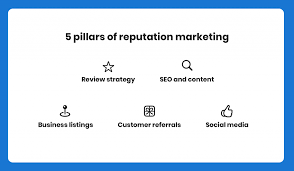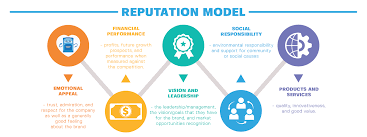Are you looking to maximize your business’s potential? Reputation marketing is a must-have tool in your arsenal to ensure long-term success. It’s an essential part of any successful marketing strategy, and one that shouldn’t be overlooked. Through understanding the customer experience, enhancing your digital presence, and strategically managing your online reputation, you can take control of how people perceive your brand. Let’s explore the three pillars of reputation marketing and how they can help you build and maintain a positive reputation for your business!
Table of Contents
ToggleWhat is Reputation Marketing?
Reputation marketing is a strategic approach to managing and improving your business’ online reputation. It involves actively monitoring and responding to customer feedback, reviews, and other online chatter about your brand in order to create a positive perception of your company. By leveraging the power of social media, you can build relationships with customers that enhance their experience and ensure that you are seen as an industry leader. Reputation marketing also helps protect the integrity of your brand by preventing negative or damaging reports from spreading and damaging your credibility. With the right strategy, reputation marketing can help you create an indelible impression among potential customers – one that will bring more traffic to your business!
Why is Reputation Marketing Important?
Reputation marketing is an essential part of any successful business. It helps create a positive perception of your company, build relationships with customers, and protect the integrity of your brand. By actively monitoring and responding to online customer feedback and reviews, reputation marketing not only strengthens your connection with customers but can also help to quickly address any negative comments or reports before they spread.
Pillar 1: Understanding the Customer Experience
Understanding the customer experience is one of the most important pillars of reputation marketing. It’s essential to know what customers think and feel about your business, in order to create a positive perception. To do this, you need to assess all customer touchpoints – from initial interactions with the brand, to post-purchase services and beyond. This includes monitoring customer feedback across all channels, from social media and review sites, to emails and surveys.
Analyzing Customer Reviews
Analyzing customer reviews is an important part of reputation marketing. Reviews provide valuable insights into what customers think and feel about your business, and can be used to inform decisions on how to further improve the customer experience. To analyze reviews effectively, it’s important to look beyond the star rating and really understand what customers are saying. Look for common themes in both positive and negative reviews, as they can help identify areas of improvement or highlight success stories.
Superdrug doesn’t exactly fill you with excitement. They sell cosmetics and beauty products. But don’t be too dismissive – with 1M followers on Instagram, they’re doing something right. With top make-up tips and short video tutorials they’re… CREATING VALUE. It’s the service customers want. It INFORMS, CONNECTS, and ENTERTAINS.
External Link: https://www.instagram.com/Superdrug/
Collecting Feedback from Customers
Collecting feedback from customers is an essential part of reputation marketing. Gathering feedback allows you to understand customers’ needs and preferences, so you can make necessary changes that will improve their experience. Surveys are a great way to collect customer data, as they allow for specific questions to be asked and can provide detailed insights into customer opinions. Additionally, it’s important to actively listen to your customers through social media, emails, phone calls and other channels.
92% of people trust recommendations from friends and family over any other type of advertising, as reported by Nielsen Word-of-mouth and referrals are likely your best source of new business. And in the online world, reviews are the digital equivalent of word-of-mouth marketing.
External Link: https://www.nielsen.com/us/en/insights/reports/2012/global-trust-in-advertising-and-brand-messages.html
Improving Customer Service & Support
Improving customer service and support is an essential part of reputation marketing. By providing excellent customer service, businesses can ensure that customers feel valued and appreciated. This will lead to increased satisfaction, loyalty, and positive reviews.
To improve customer service, businesses should focus on making sure their staff are well-trained and knowledgeable about the products or services they offer. They should also strive to be attentive and responsive to customer questions or complaints in a timely manner. Additionally, businesses should invest in the latest technology to make it easier for customers to contact them with any issues or queries.
Monitoring Online Sources for Brand Mentioning
Monitoring online sources for brand mentions is an essential part of reputation marketing. It’s important to track what people are saying about your brand in order to identify potential problems and address them quickly. This helps to protect the company’s reputation, as well as helping to build trust with customers.
The most important sources to monitor are social media platforms such as Facebook, Twitter, and Instagram. These channels offer a great opportunity for businesses to connect with customers, answer queries, and respond to complaints in real-time. Additionally, it’s important to keep an eye on review sites like Yelp or TripAdvisor where customers can leave reviews of their experiences with your business. Finally, it’s also worth keeping tabs on industry forums and blogs where conversations about your brand may be occurring.
Pillar 2: Enhancing Your Digital Presence
Enhancing your digital presence is another important pillar of reputation marketing. Building an active, engaging presence across multiple channels can help to boost the recognition and trustworthiness of your brand. This means creating content that resonates with your target audience, interacting with customers and responding to any queries or complaints in a timely manner.
Creating an Engaging Business Profile on Popular Sites
Creating an engaging business profile on popular sites is an important part of reputation marketing. This means creating content that resonates with your target audience, as well as interacting and responding to any queries or complaints. Having a professional-looking website with high quality visuals can help to make sure visitors stay on the page and interact further.
Optimizing Your Search Engine Presence
Optimizing your search engine presence is essential for businesses wanting to increase their online visibility. Start by including keywords in your webpages that customers would use when searching for a product or service like yours. You should also include meta descriptions and titles, as they help search engine crawlers understand what your website is about.
Leveraging Business Directories to Increase Visibility and Reach
Leveraging business directories to increase visibility and reach is an important part of reputation marketing. Listing your business on major directories like Yelp, Yellowpages, and Google My Business can help customers find you easily when they’re searching online. Additionally, all of these websites have built-in review systems that allow customers to rate and comment on their experience with your business. This helps potential customers decide if they want to do business with you or not.
61% of customersmade a purchase after reading a recommendation on a blog
External Link: https://review42.com/resources/content-marketing-statistics/
Crafting a Convincing Business Description
Having an effective business description is essential for any successful reputation marketing campaign. A compelling business description should clearly explain what your business does and why customers should choose you over the competition. It should be succinct, yet comprehensive, and include relevant keywords that can help drive traffic to your website.
Utilizing Testimonials and Reviews to Attract Prospective Customers
Testimonials and reviews are a powerful tool for reputation marketing. They help build trust with potential customers and can be used to highlight the successes of your business. To maximize their effect, it’s important to choose testimonials that are relevant to your target audience.
Be sure to include both positive and negative reviews in order to give an honest picture of your company and its services. Positive reviews should focus on how customers were happy with their purchase or experience, while negative ones should emphasize what the company could have done better. This will help prospective customers make more informed decisions when choosing you over the competition.
Pillar 3: Strategically Managing Your Online Reputation
Managing your online reputation is an important part of reputation marketing. This involves closely monitoring what customers are saying about your business on social media and review websites, as well as being proactive in responding to any negative comments or feedback.
It’s important to respond quickly and professionally to any negative comments or posts. Doing so shows that you value customer feedback, and are willing to work hard to make sure everyone has a positive experience with your business. Additionally, be sure to thank customers for their positive reviews and provide helpful responses where applicable.
Building a Positive Online Reputation & Average Star Rating
Building a positive online reputation and average star rating is essential for any business. A good online presence can be achieved by consistently providing quality customer service, responding to customer needs in a timely manner, and being proactive in addressing any negative feedback. Additionally, businesses should strive to maintain an average star rating of 4 or higher on review websites, as this will help them stand out from the competition and build trust with potential customers.
To ensure high ratings, businesses should focus on creating a great customer experience with every interaction. This includes responding promptly and professionally to all inquiries, resolving issues quickly and effectively, and taking time to thank customers for their feedback. Additionally, businesses can use automated software tools such as Reputation Management Systems (RMS) to track reviews across multiple platforms and respond accordingly.




